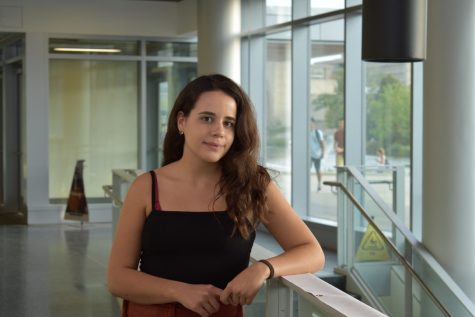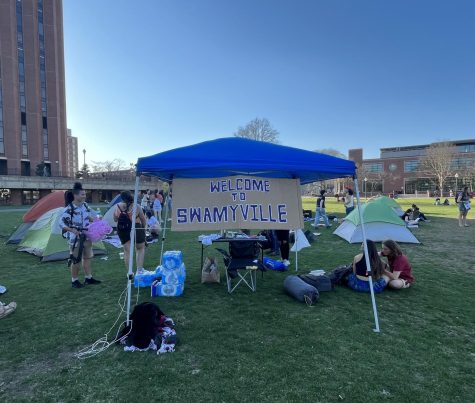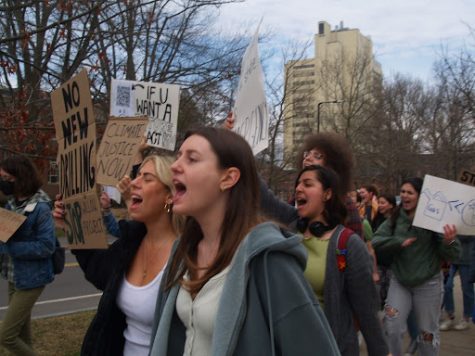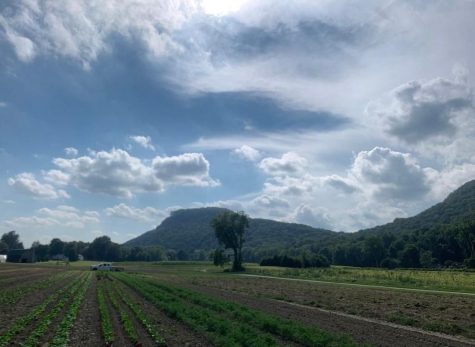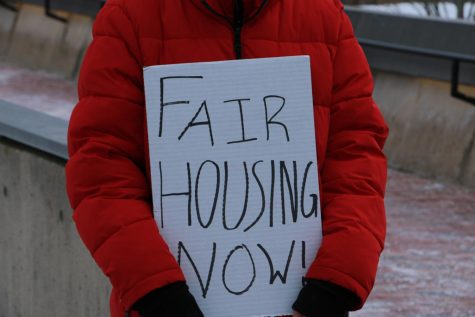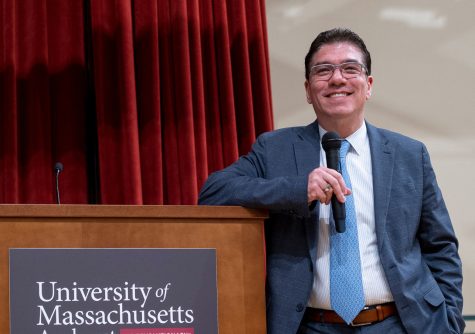Divest UMass holds teach-in on building solidarity networks and economies
Esteban Kelly speaks at the “Visions Beyond Trump” panel at UMass Amherst on Wednesday, Feb. 22, 2017. Behind him, categories like “democracy” and “solidarity” are covered with audience sticky notes detailing dreams for the future of the world. (Caeli Chesin/Amherst Wire)
AMHERST — A panel of local and national leaders at the forefront of a grassroots movement for a “solidarity economy” took place Wednesday at the University of Massachusetts Amherst Commonwealth Honors College Events Hall.
The event, a teach-in attended by about 100 people, discussed ways to resist systems of oppression that are fostered within Donald Trump’s presidency.
Divest UMass, a group of activists pushing for the university’s full divestment in fossil fuels, hosted the event that started at 6:30 p.m. The event consisted of a workshop and a panel portion, intended to teach the campus community ways to build solidarity networks and economies. A solidarity economy seeks to increase the quality of life of a region or community through not-for-profit endeavors.
Divest UMass members Mica Reel and Molly Spring introduced the workshop, telling the crowd that divestment was not enough.
“The goal is to now recast economics as a story, not a science,” said Spring.
The hour-long workshop was led by Emily Kawano, founder and coordinator of the U.S. Solidarity Economy Network and board member of the Intercontinental Network for the Promotion of Social Solidarity Economy (RIPESS) and Esteban Kelly, the executive director for the U.S. Federation of Worker Cooperatives and founder of Anti-Oppression Resource and Training Alliance (AORTA).
The audience was asked to write down on sticky notes a vision they had for the world and then put them aside for a moment.
Kelly broke down these envisionments to fit into five basic principles: solidarity, equity in dimensions, democracy, sustainability and pluralism. Listeners were then asked to pass up their sticky notes to the category where they thought they best belonged, to be displayed on poster paper in the front of the room.
Kelly interacted with the audience as he worked to explain the meaning behind the principles. In relation to the audience’s vision for the world, Kelly provided definitions to the terms.
- Solidarity is taking steps to stand with someone.
- Equity in dimensions is accommodating intersexuality.
- Democracy is the practice of communal decision making.
- Sustainability is living in the right relation to the Earth.
- Pluralism is a world where many worlds fit.
Kawano spoke on deconstructing capitalism, which also was divided into five separate parts: private ownership of means of production, profit max, commodity, production, wage labor and market.
“We need to understand the system to really change the system,” said Kawano.
The panel portion of the teach-in started at 7:30 p.m. and was comprised of Kelly, creative entrepreneur and Owner of Cooperative Energy, Recycling and Organics (CERO) Maya Gaul, Director of Center for Economic Democracy Aaron Tanaka and Communications Manager of the New Economy Coalition Natalia Linares.
The panel was run in a discussion-like format to share individual stories and views regarding solidarity economies, displacing capitalism, analysis of the economy post-election and the link of a solidarity economy to various social movements.
Topics circulated back to the engagement of people in formulating the best world they can imagine for themselves, their peers and their future.
“A lot people are made to compromise what they believe and who they are to fit into a box, just to then be exploited,” said Gaul.
Speakers urged students to be critical of the products they are consuming, practice envisionment and to share one’s own personal narrative to empower one another. Creation and creativity were addressed as another medium to integrate these philosophies.
“Artistry isn’t just a microphone, paintbrush, guitar or comic strip,” said Kelly. “Creation is a critical role in culture. Art adds another dimension to what is happening.”
Tanaka finished off the panel by rejoicing with the audience in a common uniting phrase by Assata Shakur which is often used within the Black Lives Matter movement.
“ It is our duty to fight for our freedom. It is our duty to win. We must love each other and support each other. We have nothing to lose but our chains,” Tanaka said.
Reel and Spring finished the discussion by challenging the university to invest in grassroots movements.
The workshop and panel discussion was followed by the anti-racism workshop “Tools for Collective Liberation: Advancing Economic Justice Through Multiracial Solidarity” on Thursday, Feb. 23 at 11:30 a.m. in the Cape Cod Lounge.
Email Caeli at [email protected], or follow her on Twitter @caeli_chesin.

